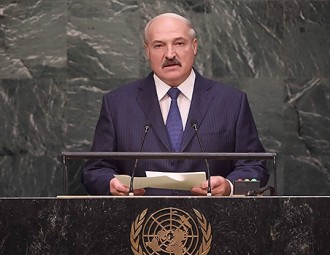The Guardian: Re-election of Lukashenka is a sham; dialog must come with clear conditions attached

Belarus’s dictator has long mastered the art of balancing between a Europe that has rightly shunned him for years, and Putin’s Russia, which keeps his economy afloat.
Svetlana Alexievich, who won this year’s Nobel literature prize, knows a thing or two about the Soviet and the post-Soviet mind. In her books, she has beautifully explored the words, anxieties, hopes and life experience of those who lived under the communist dictatorship and then saw the end of the USSR. She also stands out as the most powerful voice today relaying the democratic aspirations of Belarus, the country where she grew up – a society that remains in the grip of Europe’s last autocrat, Aliaksandr Lukashenka.
This was not just a wise Nobel Prize, but a timely one. It came just days before Lukashenka, who has been in power for over two decades, sought a fifth presidential mandate for himself. Quasi-Soviet official results were announced on Monday, handing him 83% of votes. Meanwhile, street demonstrations broke out in the capital, Minsk, in protest against what all independent observers describe as a fraudulent electoral process.
The paradox is that, as Belarus’s electoral masquerade unfolded, the EU signalled its intention to ease some of the sanctions it had imposed 10 years ago in response to Lukashenka’s repressive methods. That amounted to ignoring Ms Alexievich’s warnings about the vote, which she flagged up by recalling an old Stalinist saying: “It’s unimportant who votes for whom, what matters is who counts the vote.”
So why does the EU seem set to engage with Lukashenka? He has, it is true, released political prisoners before the election, and also avoided the sort of violent crackdowns he has been known for in the past. It’s true, also, that bringing Belarus in from the cold might be worth a few EU concessions. Russia’s aggression in Ukraine has created a completely different strategic landscape. One result is that Lukashenka has become very worried that Russian military adventurism might one day threaten his hold on power. There are plenty of ultra-nationalists in Moscow who might welcome the chance to gobble up Belarus into a Russian imperial pan-Slavic union. Such fears could certainly encourage Lukashenka to seek to break out of Russia’s tight embrace, by seeking to end his diplomatic isolation in the west.
The EU should not dismiss this hope, but any diplomatic overture should come with great caution. The EU should not hand Lukashenka the ultimate prize of complete relegitimisation. It’s important to stick to an approach where sanction relief comes only in the form of a temporary and partial suspension – not complete cancellation. Strict conditions should be attached for further European moves: the citizens of Belarus, just as those of Ukraine, are entitled to live in a normal democracy. It’s also important to remember that across the border, in Russia, democracy activists will be watching closely.
Belarus’s dictator has long mastered the art of carrying out a balancing act between a Europe that has rightly shunned him for years, and Putin’s Russia, which keeps his economy afloat and is intent on checking the spread of democracy in the region. This is a case where the EU can and must have strong influence. It is in Europe’s best interests to make sure the right levers are kept handy, to ensure that good behaviour can be rewarded, and that any dictatorial backsliding will come with a high price. Svetlana Alexievich is right to say Lukashenka cannot be trusted.
-
03.01
-
07.10
-
22.09
-
17.08
-
12.08
-
30.09








































